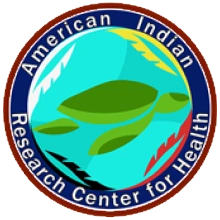American Indian Research Center for Health (AIRCH)
The American Indian Research Center for Health (AIRCH) is a collaborative project between the Inter-Tribal Council of Arizona and the University of Arizona to encourage practical research that improves the health status of American Indian people.
About AIRCH

AIRCH, a collaborative project between the Inter-Tribal Council of Arizona (ITCA) and the University of Arizona (UA), is charged with the mission to:
- increase the number of American Indian scientists and health professionals engaged in research
- educate non-Indians about the need for culturally appropriate health research within American Indian communities and research institutions
- include Tribes as stakeholders in the processes of conducting research on their reservations and in the dissemination of the research findings
The ITCA-UA partnership has been awarded three rounds of AIRCH funding, with projects in place since 2003.
Drs. Celina Valencia and James Cunningham serve as the co-directors of the American Indian Research Center for Health. Previous directors included Drs. Jennie Joe, Yvette Roubideaux and Teshia Solomon.
AISES (Advancing Indigenous People in STEM) recognizes education as a means of empowerment and personal growth, and fosters the diversity Indigenous students will bring to STEM landscapes. It provides financial aid to Indigenous students in STEM through scholarships funded by dedicated donors and program partners.
AISES Scholarships
Conducting Health Research with Native American Communities
Alcohol Use among Native Americans Compared to Whites: Examining the Veracity of the ‘Native American Elevated Alcohol Consumption’ Belief, a University of Arizona study, debunked stereotypes about Native Americans and alcohol. The article published online February 8, 2015, in the journal Drug and Alcohol Dependence, was conducted by James K. Cunningham, PhD, lead author, a U.S. Fulbright scholar and social epidemiologist with the Department of Family and Community Medicine and the Wassaja Carlos Montezuma Center for Native American Health; Teshia A. Solomon, PhD (Choctaw), associate professor of family and community medicine; and Myra Muramoto, MD, MPH, former department chair for FCM.
Click link for more information on our book:
Conducting Health Research with Native American Communities

